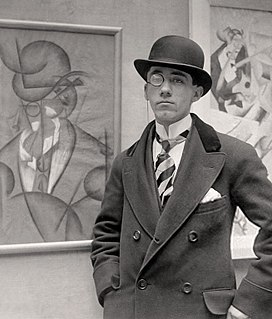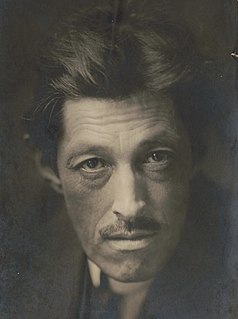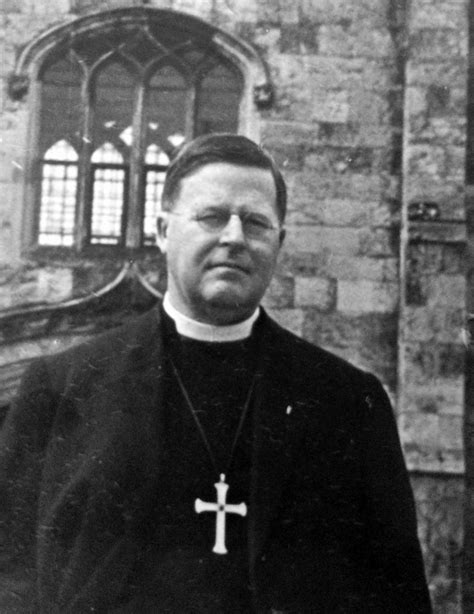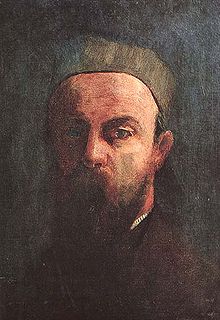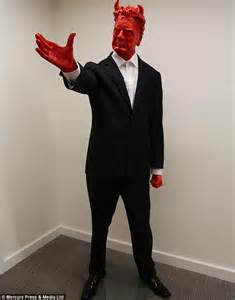A Quote by Paul Gauguin
Painting is the most beautiful of all arts. In it, all sensations are condensed, at its aspect everyone may create romance at the will of his imagination, and at a glance have his soul invaded by the most profound memories, no efforts of memory, everything summed up in one moment. Complete art which sums up all the others and completes them.
Related Quotes
There is no art which affords less opportunity to execute expression than photography. Everything is concentrated in a few seconds, when after perhaps an hours seeking, waiting, and hesitation, the photographer sees the realization of his inward vision, and in that moment he has one advantage over most arts - his medium is swift enough to record his momentary inspiration.
It is one of those problems of human nature, which may be noted down, but not solved; - although Ralph felt no remorse at that moment for his conduct towards the innocent, true-hearted girl; although his libertine clients had done precisely what he had expected, precisely what he most wished, and precisely what would tend most to his advantage, still he hated them for doing it, from the very bottom of his soul.
The whole gospel of Karl Marx can be summed up in a single sentence: Hate the man who is better off than you are. Never under any circumstances admit that his success may be due to his own efforts, to the productive contribution he has made to the whole community. Always attribute his success to the exploitation, the cheating, the more or less open robbery of others. Never under any circumstances admit that your own failure may be owing to your own weakness, or that the failure of anyone else may be due to his own defects - his laziness, incompetence, improvidence, or stupidity.
We may seem the weakest and most insignificant of all the Realms, but our strength comes in other ways. We have what no other race has: imagination. Any one of us, even the lowliest, can create worlds within ourselves; we can people them with the most extraordinary creatures, the most amazing inventions, the most incredible things. We can live in those worlds ourselves, if we choose; and in our own worlds, we can be as we want to be. Imagination is as close as we will ever be to godhead, Poison, for in imagination, we can create wonders.
Psycho-analysis has taught us that a boy's earliest choice of objects for his love is incestuous and that those objects are forbidden ones - his mother and his sister. We have learnt, too, the manner in which, as he grows up, he liberates himself from this incestuous attraction. A neurotic, on the other hand, invariably exhibits some degree of psychical infantilism. He has either failed to get free from the psychosexual conditions that prevailed in his childhood or he has returned to them - two possibilities which may be summed up as developmental inhibition and regression.
So if the worth of the arts were measured by the matter with which they deal, this art-which some call astronomy, others astrology, and many of the ancients the consummation of mathematics-would be by far the most outstanding. This art which is as it were the head of all the liberal arts and the one most worthy of a free man leans upon nearly all the other branches of mathe matics. Arithmetic, geometry, optics, geodesy, mechanics, and whatever others, all offer themselves in its service.
Worship is the submission of all our nature to God. It is the quickening of conscience by His holiness; the nourishment of mind with His truth; the purifying of imagination by His Beauty; the opening of the heart to His love; the surrender of will to His purpose - and all of this gathered up in adoration, the most selfless emotion of which our nature is capable and therefore the chief remedy for that self-centeredness which is our original sin and the source of all actual sin.
Will’s voice dropped. “Everyone makes mistakes, Jem.” “Yes,” said Jem. “You just make more of them than most people.” “I —” “You hurt everyone,” said Jem. “Everyone whose life you touch.” “Not you,” Will whispered. “I hurt everyone but you. I never meant to hurt you.” Jem put his hands up, pressing his palms against his eyes. “Will —” “You can’t never forgive me,” Will said in disbelief, hearing the panic tinging his own voice. “I’d be —” “Alone?” Jem lowered his hand, but he was smiling now, crookedly. “And whose fault is that?
Art leads to a more profound concept of life, because art itself is a profound expression of feeling. The artist is born, and art is the expression of his overflowing soul. Because his soul is rich, he cares comparatively little about the superficial necessities of the material world; he sublimates the pressure of material affairs in an artistic experience.
Nobody is made anything by hearing of rules, or laying them up in his memory; practice must settle the habit of doing, without reflecting on the rule; and you may as well hope to make a good painter, or musician, extempore, by a lecture and instruction in the arts of music and painting, as a coherent thinker, or a strict reasoner, by a set of rules, showing him wherein right reasoning consists.
The Artist submits from day to day to the fatal rhythm of the impulses of the universal world which encloses him, continual centre of sensations, always pliant, hypnotized by the marvels of nature which he loves, he scrutinizes. His eyes, like his soul, are in perpetual communion with the most fortuitous of phenomena.
I wonder, only in passing, whether the indelible ornamentation that man inscribes upon his own epidermis does not respond to a nostalgia for the universal internally generated coloring of corrollas, furs, shells, carapaces and wings. For man it has been necessary to create both works and tools outside of himself. But it may be that he retains an obscure nostalgia to create them on his own body, to make them a part of it rather than projecting them outwards onto an independent surface, where he is free to retouch them as he sees fit, which is precisely what painting and art are.
The most abiding memory of visiting Lucian Freud's studio were his eyes, with the gimlet gaze of a Hooded Falcon. But he made for very relaxing company, quick to be amused at the world and his own peccadilloes. He enjoyed the seedy squalor of his rooms in a posh house in the most desirable part of Holland Park, and living up to his persona as an oddball bohemian.

